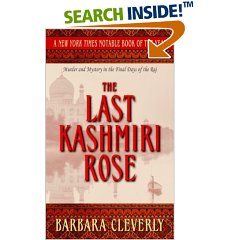Squawk Radio
Friday, September 08, 2006
Connie reads The Last Kashmiri Rose

I devoured all of Dorothy Sayers’ Peter Whimsey mysteries and while Barbara Cleverly (and you have got to love the name!) isn’t Dorothy Sayers (who is?) she’s writing about the same era and her protagonist, Scotland Yard Detective Joe Sandilands, is of the same class. It’s about here that the paths diverge. Peter did his snooping in England, Joe Sandilands investigates crime occurring in India during the period of the Raj.
Cleverly does a fabulous job of sucking you into the often claustrophobic, class-conscious, and insular scoiety of the English expansionists. The world she brings to life describes two cultures living parallel to one another, as oddly interdependent as they are segregated. When they do intersect, it cannot help but result in tragedy.
I love the conceit of the book: the ragtime atmosphere transported to the exotic realms of the Raj, the English upper classes desperation to hold on to a way of life World War One saw obliterated, the heroism and/or knavery of the young soldiers. Oh, and the mystery is pretty good, too.
Joe Sandilands, about to be discharged and sent home to London, is given one last duty at an English army outpost: find out if there is anything more than coincidence in the string of deaths that have claimed the lives of five officers' wives over the course of a dozen years. Of course, there is—there wouldn’t have been a mystery otherwise, but in true Sayers fashion, the motives make the story.
Cleverly doesn’t cheat. She seeds the clues throughout the book and if her characterizations are a little broad, her story telling is crisp, fast-paced and toothsome in the best Sayers sense of the word. I can hear the English accents, the trill of laughter, feel the ennui of the jazz babies doing their best to recreate cool London nightlife in the stifling Indian heat and experience the ominous threat that stalks them.
The Last Kashmiri Rose is the first in what is currently a five books series. I’m heading to the store to pick up the next.

I devoured all of Dorothy Sayers’ Peter Whimsey mysteries and while Barbara Cleverly (and you have got to love the name!) isn’t Dorothy Sayers (who is?) she’s writing about the same era and her protagonist, Scotland Yard Detective Joe Sandilands, is of the same class. It’s about here that the paths diverge. Peter did his snooping in England, Joe Sandilands investigates crime occurring in India during the period of the Raj.
Cleverly does a fabulous job of sucking you into the often claustrophobic, class-conscious, and insular scoiety of the English expansionists. The world she brings to life describes two cultures living parallel to one another, as oddly interdependent as they are segregated. When they do intersect, it cannot help but result in tragedy.
I love the conceit of the book: the ragtime atmosphere transported to the exotic realms of the Raj, the English upper classes desperation to hold on to a way of life World War One saw obliterated, the heroism and/or knavery of the young soldiers. Oh, and the mystery is pretty good, too.
Joe Sandilands, about to be discharged and sent home to London, is given one last duty at an English army outpost: find out if there is anything more than coincidence in the string of deaths that have claimed the lives of five officers' wives over the course of a dozen years. Of course, there is—there wouldn’t have been a mystery otherwise, but in true Sayers fashion, the motives make the story.
Cleverly doesn’t cheat. She seeds the clues throughout the book and if her characterizations are a little broad, her story telling is crisp, fast-paced and toothsome in the best Sayers sense of the word. I can hear the English accents, the trill of laughter, feel the ennui of the jazz babies doing their best to recreate cool London nightlife in the stifling Indian heat and experience the ominous threat that stalks them.
The Last Kashmiri Rose is the first in what is currently a five books series. I’m heading to the store to pick up the next.
Connie Brockway, 10:44 PM
8 comments